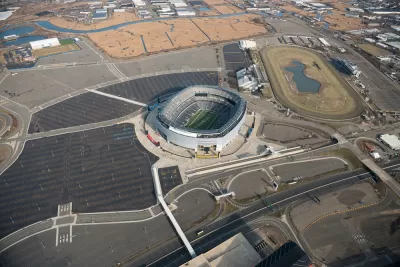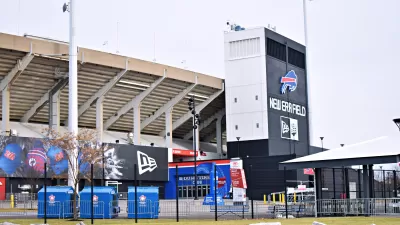There are only 30 NFL teams in the country—and many of those still have stadiums within the 15-year window of obsolescence for stadium facilities.

All ideas are on the table in an effort to revive the struggling football stadium construction industry.
The responsibility to fund the construction of new, lavish football stadiums to house the National Football League has traditionally fallen to taxpayers, but after a building boom spanning the last several years, a glut in football stadium supply has led to layoffs, declining wages, and decreasing tax revenues for local and state governments. A shortage of professional football leagues is also contributing to the football stadium construction industry's doldrums.
A bipartisan ad-hoc committee House committee convened for the first time today in an effort to address the national football stadium construction crisis, making clear that Congress intended to bail out the football stadium construction industry.
"Now that the NFL has moved to Los Angeles, and ditched those backwater dead-ends from whence they came, the football stadium industry will need new kinds of support to keep up its taxpayer subsidized quest for world domination. That's where Congress comes in," said a noticeably smug committee chairman Jerry Davis-Kraft, who spoke on behalf of all Americans.
Options discussed at the first hearing of the committee included layering NFLs on top of each other to create more need for football stadiums as well as potentially invading foreign countries and setting up American-style football leagues. A sub-committee meeting scheduled for later in the day is tasked with locating any and all urban waterfront locations in the country, except St. Louis and San Diego, for potential development.
FULL STORY: Congress to Bail Out the Football Stadium Industry

Alabama: Trump Terminates Settlements for Black Communities Harmed By Raw Sewage
Trump deemed the landmark civil rights agreement “illegal DEI and environmental justice policy.”

Study: Maui’s Plan to Convert Vacation Rentals to Long-Term Housing Could Cause Nearly $1 Billion Economic Loss
The plan would reduce visitor accommodation by 25% resulting in 1,900 jobs lost.

Planetizen Federal Action Tracker
A weekly monitor of how Trump’s orders and actions are impacting planners and planning in America.

Waymo Gets Permission to Map SF’s Market Street
If allowed to operate on the traffic-restricted street, Waymo’s autonomous taxis would have a leg up over ride-hailing competitors — and counter the city’s efforts to grow bike and pedestrian on the thoroughfare.

Parklet Symposium Highlights the Success of Shared Spaces
Parklets got a boost during the Covid-19 pandemic, when the concept was translated to outdoor dining programs that offered restaurants a lifeline during the shutdown.

Federal Homelessness Agency Places Entire Staff on Leave
The U.S. Interagency Council on Homelessness is the only federal agency dedicated to preventing and ending homelessness.
Urban Design for Planners 1: Software Tools
This six-course series explores essential urban design concepts using open source software and equips planners with the tools they need to participate fully in the urban design process.
Planning for Universal Design
Learn the tools for implementing Universal Design in planning regulations.
Caltrans
Smith Gee Studio
Institute for Housing and Urban Development Studies (IHS)
City of Grandview
Harvard GSD Executive Education
Toledo-Lucas County Plan Commissions
Salt Lake City
NYU Wagner Graduate School of Public Service





























